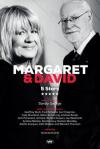 Kin: An extraordinary filmmaking family is the second tribute book I’ve reviewed in Wakefield Press’s Don Dunstan Award series. The first, Margaret & David: 5 stars, was also edited by Amanda Duthie. Like that book, Kin contains short reflections and essays on the contribution made to Australia’s film industry and culture by Freda Glynn, her children Erica Glynn and Warwick Thornton, and her grandchildren Dylan River and Tanith Glynn-Maloney. The book also includes brief biographies of the five individuals involved, and a family tree, all of which help orient the reader.
Kin: An extraordinary filmmaking family is the second tribute book I’ve reviewed in Wakefield Press’s Don Dunstan Award series. The first, Margaret & David: 5 stars, was also edited by Amanda Duthie. Like that book, Kin contains short reflections and essays on the contribution made to Australia’s film industry and culture by Freda Glynn, her children Erica Glynn and Warwick Thornton, and her grandchildren Dylan River and Tanith Glynn-Maloney. The book also includes brief biographies of the five individuals involved, and a family tree, all of which help orient the reader.
In my review of Margaret and David, I focused on one aspect of the pieces that interested me, which was the commentary on what I called “the practice of criticism”. That made sense, because Margaret and David are critics. Freda Glynn and family are a very different awardees. They are indigenous Australians from central Australia, and they have championed and practiced Aboriginal screen story-telling for over three decades, their influence reaching way beyond Australia. Freda Glynn helped establish CAAMA (the Central Australian Aboriginal Media Association) and Imparja Television. Erica Glynn and Warwick Thornton are internationally renowned filmmakers (and more), with third generation Dylan River and Tanith Glynn-Maloney following in their filmmaking footsteps.
The pieces are written by a wide variety of indigenous and non-indigenous arts people from around the world, such as actor Deborah Mailman, authors Bruce Pascoe (whose Dark emu I’ve reviewed here) and Larissa Behrendt, critics Margaret and David (of course!), arts administrator Kim Williams, and American academic Faye Ginsburg, to name just some of the over 20 contributors.
Most of the pieces comprise personal reflections and heartfelt tributes to the various individuals in the family, but for those wanting a good overview of how it all started, Philip Batty’s longer piece, “Freda Glynn and the evolution of CAAMA: A personal reflection”, is well worth reading. Too few Australians know about our indigenous pioneers – who they are, let alone what they’ve done and the challenges they’ve faced doing it. Having worked, as most of you know by now, in the film archive/library industry most of my career, I became aware of CAAMA early in its existence, but I didn’t know half the story told by Batty – the personal and the political! He tells of CAAMA applying for money in 1988 from the Australian Bicentennial Authority:
Some city-based Aboriginal groups protested again CAAMA accepting the bicentennial ‘blood money’ and, on several occasions, Freda fronted up to these groups to argue that all government funding to Aboriginal organisations could be described as ‘blood money’. Indeed, at a particularly hostile meeting, I remember thinking back to the first time I met Freda when she was confronted by the all-white Citizens for Civilised Living [can you believe such a name!!]. On this occasion it was an all-Aboriginal crowd she confronted with the same bravery.
It’s important to note here that, as Stan Grant and so many others have stated, indigenous people are not united in their responses to how their cause should be progressed – any more than non-indigenous people are about their lives. I’m frequently astonished by how we white Australians seem to expect all other groups to be united in a way that we are not. It denies people the individual agency in their lives that we demand for ourselves.
Anyhow, rant over. I’m not going to spend a lot of time on this book. I’m unusually behind in my reviews, and this book is, in one sense, of specialist interest, though in another I’d argue that it would offer something to all Australians interested in our cultural history. It does have a political thread – of course – but that thread is unified by a single foundational idea, the idea that sits at the bottom of all that this impressive family does. I’ll let Bruce Pascoe tell you:
The real history of the country was eliminated from our curriculum, our society, our politics, our morality. If the best-educated people in the land, the mild professors and urbane historians, can fabricate a history of such blinding connivance then another tactic has to be employed if the oppressed are to receive any form of justice. And that tactic is on old one: story.
What Freda Glynn and her family have done – as this book shows – is to set up infrastructures (the CAAMA group supports music, film, television, radio, for example) that facilitate that story being told, to provide training for indigenous people in creating and producing their stories, and of course, to make stories themselves. Warwick Thornton’s films Samson and Delilah and Sweet country are just two examples of a swathe of productions members of this family have made and/or facilitated.
All I can say is may the Glynn family continue to make stories that tell us as it is! Meanwhile, I commend this book to you as an excellent introduction to all that can be done when people put their hearts and souls into something they believe in.
 Amanda Duthie (ed.)
Amanda Duthie (ed.)
Kin: An extraordinary filmmaking family
Mile End: Wakefield Press, 2018
176pp.
ISBN: 9781743056028
(Review copy courtesy Wakefield Press)

